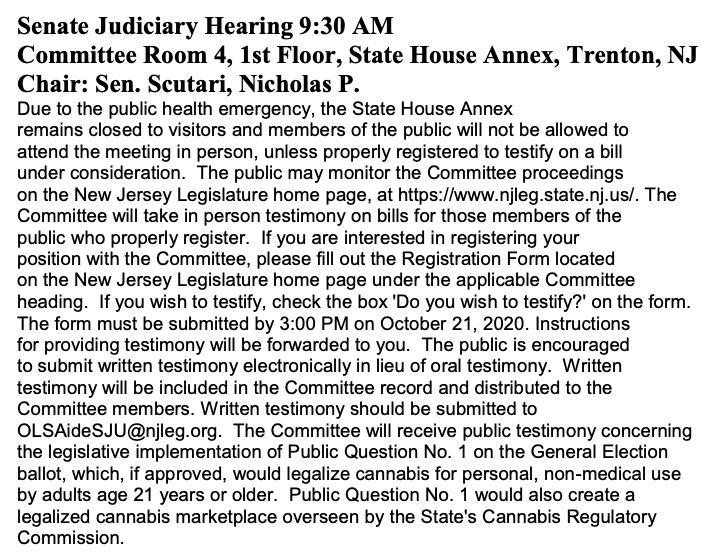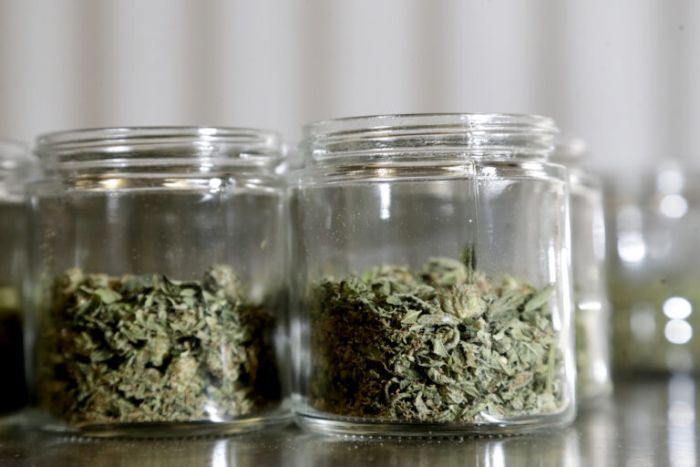New Jersey Governor Works To Get Out The Vote For Marijuana Legalization Referendum
The governor of New Jersey is amplifying his support for a marijuana legalization referendum that will appear on the state’s November ballot.
In an email blast sent by the New Jersey Democratic State Committee on Wednesday, Gov. Phil Murphy (D) wrote that legalization was a priority of his as he campaigned for governor, and he emphasized racial disparities in cannabis enforcement.
“Legalization would right those wrongs while also spurring massive economic development opportunities, job creation, and new tax revenue,” he said. “Now, we have the opportunity to get this done and finally legalize adult-use marijuana here in the Garden State, and I need your help to make it happen. Vote Yes on Public Question #1 on your ballot.”
“It has taken longer than we hoped to get to this point. Many well-meaning leaders have their reasons for opposing legalization, and we take their objections seriously,” he added. “But the overwhelming evidence points to a clear reality that this is something we must do to make our state both stronger and fairer.”
Murphy also wrote about the economic toll of enforcing prohibition, the long-lasting consequences of having a marijuana conviction on a person’s record and the fact that a growing number of states are legalizing cannabis for adult use.
“Voting Yes on Public Question #1 will legalize marijuana for adult use, while also creating a new regulatory structure to make sure operators are following the law and ensure that minors are not able to purchase the product. Legalization will not be the end of the story—there is more work to do, particularly in expunging past marijuana-related offenses. This is our chance to make history in New Jersey, and it’s all up to you.”
The governor said in July that legalizing cannabis is “an incredibly smart thing to do” both from an economic and social justice perspective.
Legislators attempted to enact the policy change during the last session, but when negotiations stalled, they opted to put the question to voters in the form of a referendum. If the measure is approved on Election Day, the legislature will then have to pass implementing legislation containing details for how the legal cannabis market will work.
Recent polling indicates that the proposal has strong support among New Jersey voters. A survey from the law firm Brach Eichler that was released last week shows that 65 percent of likely voters are in favor of the policy change. That’s consistent with the results of a poll the firm published last month, signaling that support is steady.
The governor’s message to voters comes one week after NJ CAN 2020, a coalition of civil rights and drug policy reform groups, launched their first video ad promoting the legalization referendum.
In June, the state Assembly passed a cannabis decriminalization bill last month that would make possession of up to two ounces a civil penalty without the threat of jail time.
Read Murphy’s full email in support of approving the legalization measure below:
When I first announced my campaign for Governor, legalizing adult-use marijuana was one of my top priorities. It was as clear then as it is now — marijuana prohibition causes serious, lasting damage to our state, especially to the 35,000 mostly young, Black and Hispanic residents who are arrested for possession of marijuana every year. In fact, Black residents are 3.5 times more likely to be arrested for marijuana possession than White residents. Legalization would right those wrongs while also spurring massive economic development opportunities, job creation, and new tax revenue.
Now, we have the opportunity to get this done and finally legalize adult-use marijuana here in the Garden State, and I need your help to make it happen. Vote Yes on Public Question #1 on your ballot.
It has taken longer than we hoped to get to this point. Many well-meaning leaders have their reasons for opposing legalization, and we take their objections seriously. But the overwhelming evidence points to a clear reality that this is something we must do to make our state both stronger and fairer. Consider for example:
New Jersey spends about $147 million a year on the legal processing of marijuana possession and makes 35,000 annual arrests. Using our public safety dollars for marijuana arrests doesn’t make us any safer. By legalizing adult-use marijuana, we can free up police resources to focus on serious, violent and unsolved crimes, and reinvest those saved dollars into social services.
Our current marijuana laws can ruin lives based on one decision. Under current law, a person can land in jail over marijuana – with a criminal record that stigmatizes them for life and can make it harder to get a job, an apartment or a credit card; to adopt a child; or to visit one’s own children. Legalization has the potential to remove unfairly harsh punishments now suffered by entire families due to marijuana offenses.
Over the past decade, 11 other states and Washington, DC have all legalized adult-use marijuana. These states have not faced significant health or safety problems, have raised billions of dollars for vital public services, and have been able to focus law enforcement on more serious and violent crimes. We know that marijuana legalization works – and passing this ballot measure will allow New Jersey to take advantage of everything that we’ve learned from the states that went before us.
Voting Yes on Public Question #1 will legalize marijuana for adult use, while also creating a new regulatory structure to make sure operators are following the law and ensure that minors are not able to purchase the product. Legalization will not be the end of the story — there is more work to do, particularly in expunging past marijuana-related offenses.
This is our chance to make history in New Jersey, and it’s all up to you. Vote Yes on Public Question #1. You may need to turn over your Vote by Mail ballot or flip to the second page to find Public Questions, so make sure to examine your ballot carefully.
Thank you,
Phil Murphy


